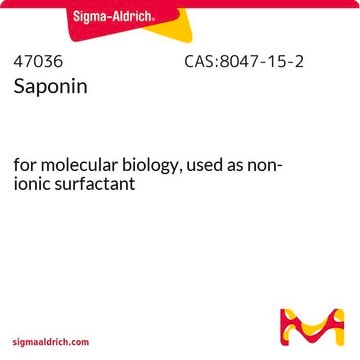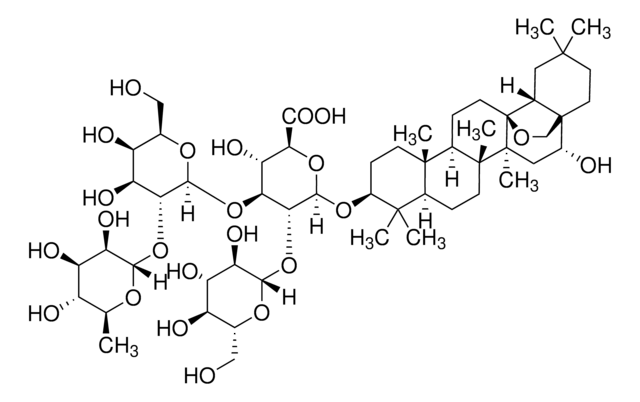S4521
Saponin from Quillaja sp.
Sapogenin content 20-35 %
Přihlásitk zobrazení cen stanovených pro organizaci a smluvních cen
About This Item
Doporučené produkty
description
non-ionic
composition
Sapogenin content, 20-35%
technique(s)
HPLC: suitable
protein quantification: suitable
sulfated ash
≤10%
General description
Saponins are steroid or triterpenoid glycosides. They are biosurfactants that have several uses in the food and cosmetic industry.
Application
Saponin from Quillaja bark has been used:
- to stain fertilized oocytes
- in the analysis of intracellular cytokine production
- to permeabilize dendritic cells
Biochem/physiol Actions
Saponins solubilize the low density lipoprotein (LDL) fraction of cholesterol in micelles, thus lowering their concentration. Saponin from Quillaja bark is used as a flavoring agent in food and beverages. This saponin has been shown to enhance immune-cell proliferation in vitro.
Potent hemolytic when injected i.v.; surfactant that enhances penetration of proteins and other macromolecules through cell membranes; it also has been used as an adjuvant for vaccines.
Preparation Note
Purified to remove low molecular weight contaminants
signalword
Warning
hcodes
Hazard Classifications
Eye Irrit. 2 - STOT SE 3
target_organs
Respiratory system
Storage Class
11 - Combustible Solids
wgk_germany
WGK 2
flash_point_f
Not applicable
flash_point_c
Not applicable
ppe
dust mask type N95 (US), Eyeshields, Gloves
Osvědčení o analýze (COA)
Vyhledejte osvědčení Osvědčení o analýze (COA) zadáním čísla šarže/dávky těchto produktů. Čísla šarže a dávky lze nalézt na štítku produktu za slovy „Lot“ nebo „Batch“.
Již tento produkt vlastníte?
Dokumenty související s produkty, které jste v minulosti zakoupili, byly za účelem usnadnění shromážděny ve vaší Knihovně dokumentů.
Zákazníci si také prohlíželi
Dynamic chromatin modifications characterise the first cell cycle in mouse embryos.
Santos F
Developmental Biology, 280(1), 225-236 (2005)
Yvonne Lange et al.
Biochemistry, 48(36), 8505-8515 (2009-08-07)
A few membrane-intercalating amphipaths have been observed to stimulate the interaction of cholesterol with cholesterol oxidase, saponin and cyclodextrin, presumably by displacing cholesterol laterally from its phospholipid complexes. We now report that this effect, referred to as cholesterol activation, occurs
Isolation of myeloid and plasmacytoid dendritic cells from human bronchoalveolar lavage fluid.
Tsoumakidou M
Immunology and Cell Biology, 84(3), 267-273 (2006)
R Martin-Ibañez et al.
Human reproduction (Oxford, England), 23(12), 2744-2754 (2008-08-22)
Human embryonic stem cells (hESCs) have potential use in clinical therapy and regenerative medicine. One of the major challenges regarding the application of these cells is the development of an efficient cryopreservation protocol, since current methods, which include slow-freezing-rapid thawing
Adjuvant effects of saponins on animal immune responses.
Rajput ZI
Journal of Zhejiang University. Science. B, 8(3) , 153-161 (2007)
Náš tým vědeckých pracovníků má zkušenosti ve všech oblastech výzkumu, včetně přírodních věd, materiálových věd, chemické syntézy, chromatografie, analytiky a mnoha dalších..
Obraťte se na technický servis.













